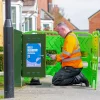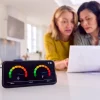Ofcom Consults on the Future of UK Phone Numbers and Porting UPDATE
The UK communications regulator, Ofcom, has launched a shotgun blast of three new consultations today that cover how the fixed line broadband ISP and phone market will need to change as consumers are migrated from old analogue telephone services (PSTN) to new digital Voice-over-Internet-Protocol (VoIP) platforms.
At present operators like Openreach (BT) tend to supply a copper phone line to consumers when ordered or will bundle it at the same time with a broadband service, although the latter is currently still considered to be somewhat of an optional extra (i.e. you get the phone service first and then broadband).
However today most of us only take a landline for broadband (i.e. fewer and fewer people each year still make calls via their landline) and the roll-out of ultrafast Fibre-to-the-Premises (FTTP) based networks, which can only carry data and not analogue phone calls (i.e. optical fibres carry data in laser light, while older metallic lines use electrical signals), means that all of this is about to go through a fundamental change.
Advertisement
Back in 2012 UK people made a total of 103 billion minutes of landline calls, which has fallen to just 54 billion in 2017. Over the same period mobile call minutes have increased from 132.1 billion to 148.6 billion. This gives a good indication of how the market has shifted and where it’s going.
In the future Openreach’s approach, as well as that of other operators, will be reversed as they move from analogue to IP / VoIP based digital communications. In other words, broadband will become the primary service you buy and phone (voice calling) the optional extra. A lot of alternative fixed wireless and full fibre (FTTP) broadband ISPs already do this but the wider more established market is playing catch-up.
The shift to all-IP style networks also creates new challenges, such as in terms of how you support vulnerable landline phone-only consumers (often elderly users), maintain access to emergency services (e.g. during power outages, since most IP based calling platforms will cease to function without battery backup) and ensure that it’s possible to more effectively port (switch) phone numbers to all sorts of different IP based platforms.
Ofcom already has a number of work programmes on-going to investigate various different aspects of this process (e.g. the proposed blockchain approach to number porting) and in keeping with that they’ve today launched three more consultations to cover some related aspects of the wider transition.
Advertisement
Promoting trust in telephone numbers
As part of Ofcom’s work to tackle nuisance and scam calls, we believe a common database of phone numbers is needed to enable phone companies to verify that Caller ID numbers are genuine.
A common database could also help improve the process of letting people and businesses keep (or ‘port’) their number when they switch providers.
We are inviting comments on our initial views by 6th June 2019. We intend to publish a summary of responses to this consultation and outline next steps in the summer.
We are inviting views on how landline numbers should evolve to keep up with changes in how they are used – including whether area codes and their associated location information should be retained.
We are also looking at whether certain phone numbers might continue to be used by people to make small payments.
This consultation closes on 20th June 2019, and we plan to set out further policy proposals for this area later this year.
Future of interconnection and call termination
Finally, we are seeking views on what the move to internet calls might mean for our regulation of ‘interconnection’ – the process of ensuring all calls made from one network to another are connected.
The move may also have implications for how we regulate what phone companies charge each other for connecting calls between their networks.
This consultation closes on 6th June 2019. Responses will inform our next review of interconnection and termination markets, which we expect to consult on early in 2020.
The ‘future of telephone numbers’ consultation is one of the more interesting aspects because VoIP style services do not need area codes to tell them where to send a call. One option that Ofcom may consider here is whether or not area codes could be scrapped, which might enable you to have a number that never changes no matter where you are or what service / network you use.
Ensuring such numbers can be used on lots of different platforms is an extremely complicated problem, albeit an achievable one. On the other hand many older users tend to be opposed to the idea of losing geographic meaning from area codes and it could make filtering calls harder, while younger people find the whole idea more enticing.
Chair of ITSPA, Eli Katz, said:
“This consultation phase is a crucial step in shaping the future of our entire industry. We welcome the opportunity to engage and indeed are positive around the long-term benefits that Ofcom are looking to tackle. We also welcome Ofcom’s acceptance that as we transition to an all-IP world, certain areas of regulation (Interconnection for example) may need a review to ensure the competitiveness of the UK telecoms sector is maintained.
ITSPA welcome the concept of forming a central database of numbers. This has long been necessary to tackle some of the industry pains of the past decade, particularly nuisance calls and porting. We have been heavily involved in Ofcom’s recent blockchain proof of concept, which is being looked into as a possible solution for number management and number portability.
Whilst this is a positive step, we were concerned by Ofcom’s position that they expect industry to lead in the wider development around the database concept. ITSPA remains of the belief that Ofcom must play some active role in its development. There have been too many industry false starts on number portability over the past 10 years for it not to require some Ofcom leadership.
Beyond the blockchain proof of concept plan, we would urge the regulator to outline its expected outcome in terms of consumer porting experience to assist the industry in developing a more advanced platform and would be happy to support them in this project.”
As usual we’ll be keeping a close eye on all this to see what conclusions the regulator reaches.
UPDATE 12th April 2019
Advertisement
Updated the article to add a comment from the Internet Telephony Services Providers’ Association (ITSPA).
Mark is a professional technology writer, IT consultant and computer engineer from Dorset (England), he also founded ISPreview in 1999 and enjoys analysing the latest telecoms and broadband developments. Find me on X (Twitter), Mastodon, Facebook, BlueSky, Threads.net and Linkedin.
« Big UK Broadband ISPs Have Big Concerns About DNS over HTTPS
ISP Shell Energy Discounts Broadband Prices for Easter 2019 »

















































Comments are closed